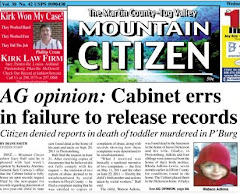Attorney General Jack Conway has ruled that the state Cabinet for
Health and Family Services violated the Open Records Act by withholding information about the death of a 2-year-old Prestonsburg
boy whose aunt and uncle have been charged with killing him.
The Mountain Citizen, a weekly newspaper in Inez, asked for all information the cabinet had on Watson Adkins, whom the state had removed from his mother's home and placed in the custody of his maternal aunt, Gladys Dickerson of Prestonsburg. The boy was found unresponsive there in September 2011.
The cabinet "initially did not provide two previous unsubstantiated reports of abuse against Gladys and Jason Dickerson to the newspaper but later supplied the reports with much of the information redacted," reports Beth Musgrave of the Lexington Herald-Leader. "The opinion said the cabinet could not redact some of that information, including the names of perpetrators involved in the unsubstantiated reports."
Conway said the cabinet also violated the records law "by failing to cite either state or federal law that allowed it to withhold or redact certain information," Musgrave writes, noting that the case is the latest "in a more that three-year legal battle between the media and the Cabinet for Health and Family Services over what can be released after a child is killed from abuse and neglect. . . . What information can be redacted or blacked out of those files is currently on appeal."
The cabinet has 30 days from Monday, the date of the open-records decision, to appeal it to circuit court.
Citizen Editor Gary Ball told Musgrave that he sought the information after hearing that the cabinet had been told the Dickersons were mistreating the boy and his four siblings. “I got heavily redacted information,” he said. “I wanted all records from the time that they were removed from the home to the time of the criminal charges.” He said the mother had taken photos of suspicious injuries to the children.
"Ball said that the cabinet had investigated two reports of alleged abuse against Gladys and Jason Dickerson before September 2011," Musgrave writes. "Ball received the reports from the cabinet but it’s difficult to tell why those reports were not substantiated." He told Musgrave, “I want the records that will show me how they made that determination that those reports were unsubstantiated.” (Read more)
The Mountain Citizen, a weekly newspaper in Inez, asked for all information the cabinet had on Watson Adkins, whom the state had removed from his mother's home and placed in the custody of his maternal aunt, Gladys Dickerson of Prestonsburg. The boy was found unresponsive there in September 2011.
The cabinet "initially did not provide two previous unsubstantiated reports of abuse against Gladys and Jason Dickerson to the newspaper but later supplied the reports with much of the information redacted," reports Beth Musgrave of the Lexington Herald-Leader. "The opinion said the cabinet could not redact some of that information, including the names of perpetrators involved in the unsubstantiated reports."
Conway said the cabinet also violated the records law "by failing to cite either state or federal law that allowed it to withhold or redact certain information," Musgrave writes, noting that the case is the latest "in a more that three-year legal battle between the media and the Cabinet for Health and Family Services over what can be released after a child is killed from abuse and neglect. . . . What information can be redacted or blacked out of those files is currently on appeal."
The cabinet has 30 days from Monday, the date of the open-records decision, to appeal it to circuit court.
Citizen Editor Gary Ball told Musgrave that he sought the information after hearing that the cabinet had been told the Dickersons were mistreating the boy and his four siblings. “I got heavily redacted information,” he said. “I wanted all records from the time that they were removed from the home to the time of the criminal charges.” He said the mother had taken photos of suspicious injuries to the children.
"Ball said that the cabinet had investigated two reports of alleged abuse against Gladys and Jason Dickerson before September 2011," Musgrave writes. "Ball received the reports from the cabinet but it’s difficult to tell why those reports were not substantiated." He told Musgrave, “I want the records that will show me how they made that determination that those reports were unsubstantiated.” (Read more)
